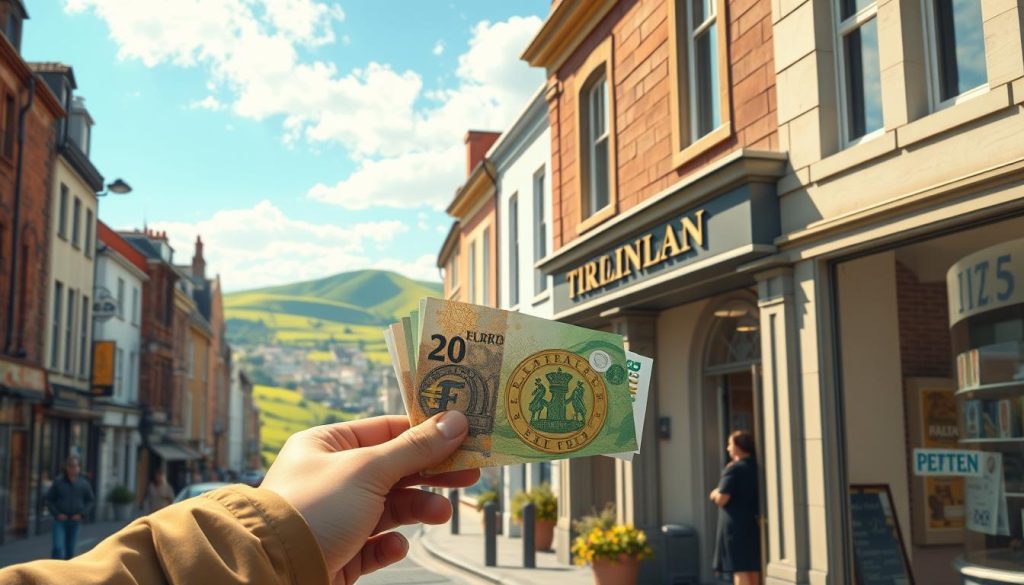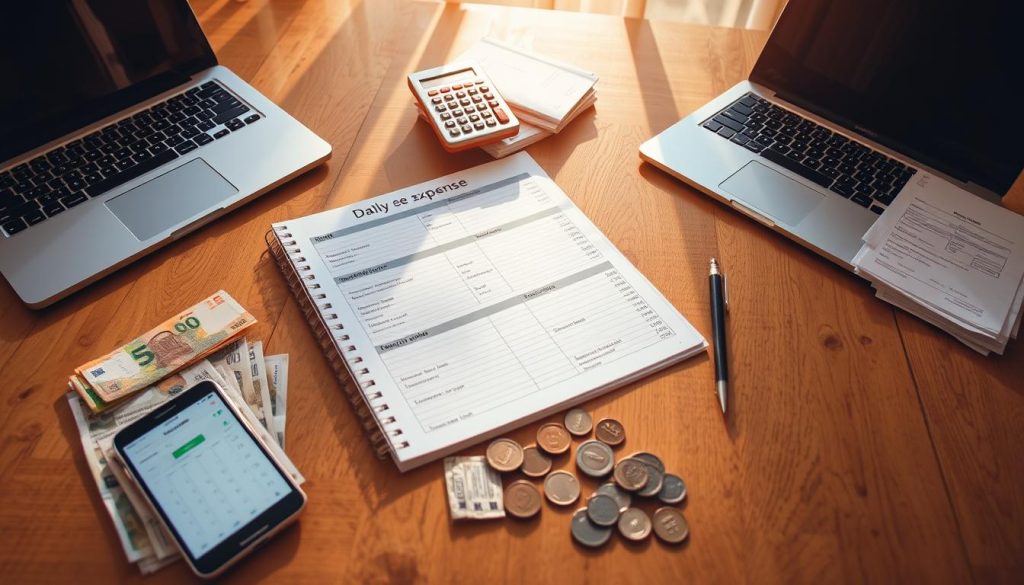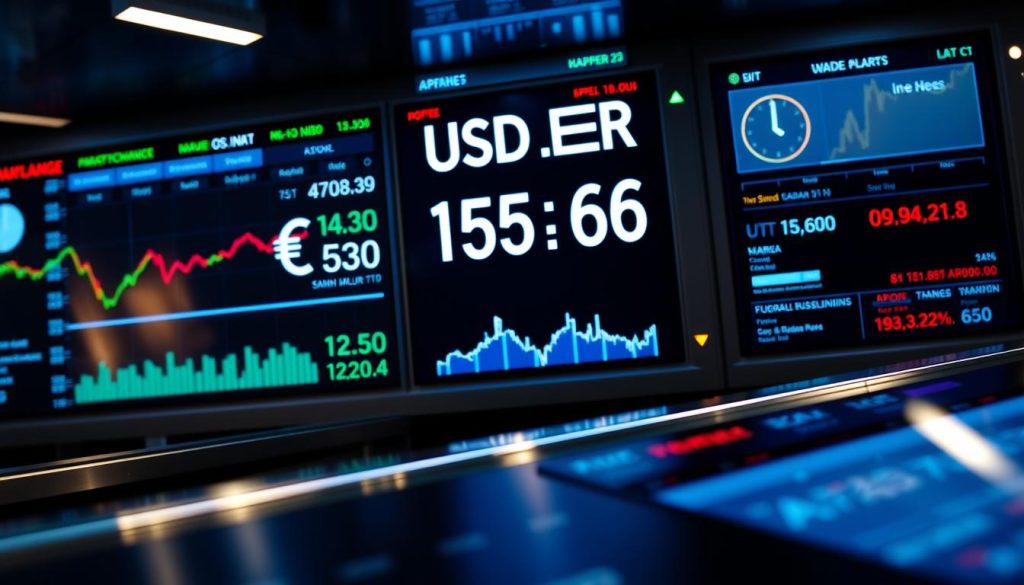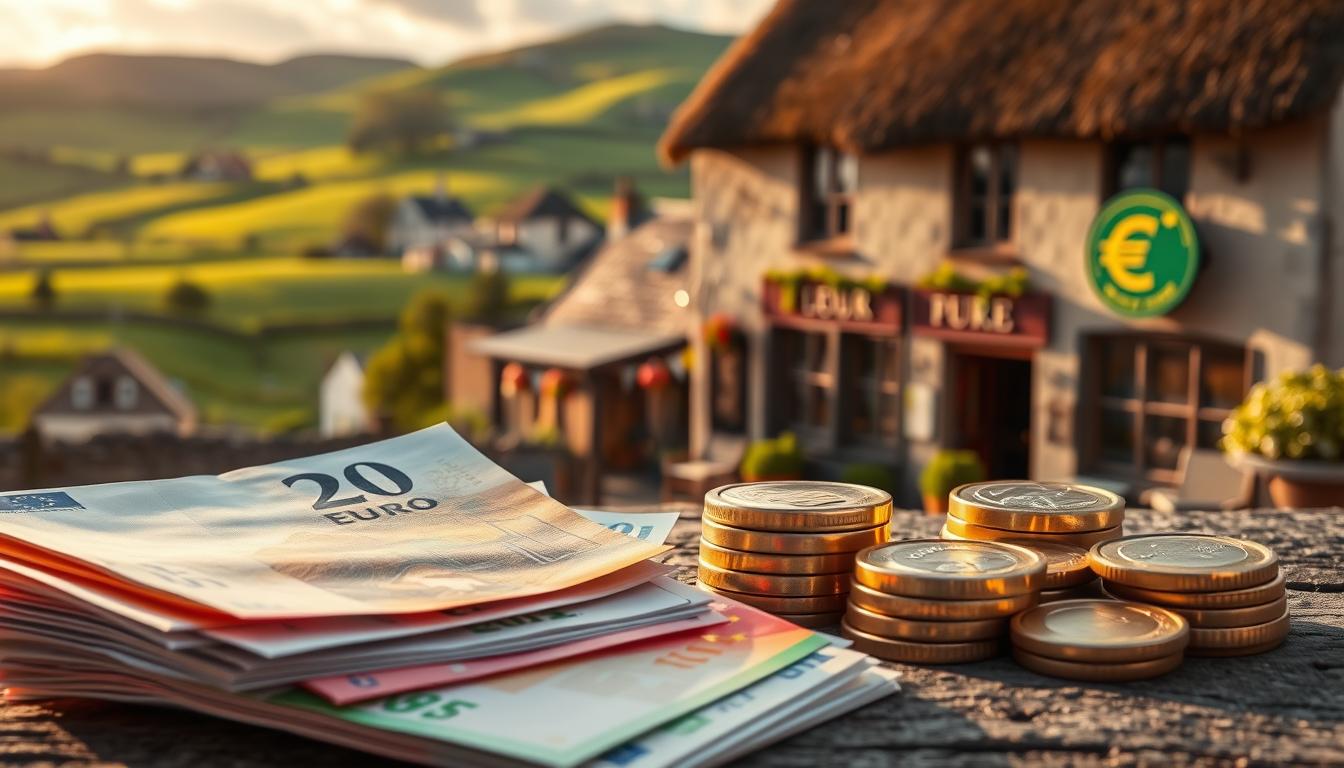✓ Accommodations✓ Flights✓ Rental Cars✓ Tours & Activities
Did you know that Ireland uses two distinct currencies? While the euro is the official currency in the Republic, Northern Ireland uses the British pound. This unique setup can make managing your money a bit tricky if you’re not prepared.
Understanding how to handle currency and payment methods is essential for a seamless trip. Whether you’re exchanging cash, using cards, or budgeting for your adventures, this guide will help you navigate it all.
From avoiding hidden fees to finding the best exchange rates, you’ll learn how to make the most of your travel experience. Ready to explore Ireland without worrying about your wallet? Let’s dive in!
Introduction to Currency and Payments in Ireland
Understanding currency and payment methods can make or break your travel experience. Proper management of your money ensures you avoid unnecessary fees and enjoy a seamless trip. Whether you’re exchanging cash or using cards, planning ahead is essential.
Why Currency Management Is Essential on Your Trip
One of the biggest challenges travelers face is handling different currencies. In some regions, you’ll need euros, while others require pounds. This dual system can lead to confusion if you’re not prepared.
High fees at airport exchange desks and ATMs are common pitfalls. Planning ahead helps you secure better rates and avoid extra costs. For example, withdrawing cash from a local bank often offers a more favorable exchange rate than airport kiosks.
Using a credit card for purchases is convenient, but foreign transaction fees can add up. Always check with your card provider to understand these charges. Additionally, carrying some cash for tips and small purchases is a smart move.
| Payment Method | Pros | Cons |
|---|---|---|
| Cash | Accepted everywhere, no fees for small purchases | Risk of loss, unfavorable exchange rates at airports |
| Credit Card | Convenient, widely accepted | Foreign transaction fees, not ideal for small purchases |
| ATM Withdrawals | Better exchange rates, easy access | Possible withdrawal fees, daily limits |
By understanding these factors, you can make informed decisions and enjoy your trip without financial stress. Start by researching exchange rates and fees before you depart, and always have a mix of payment options available.
Understanding the Dual Currency System in Ireland
The island of Ireland operates with two distinct currencies, each tied to different regions. This unique setup can be both fascinating and challenging for visitors. Knowing how to handle these currencies ensures a smoother travel experience.

Euro in the Republic of Ireland
In the Republic of Ireland, the euro is the official currency. Cities like Dublin and Cork use this currency for all transactions. The euro is divided into coins and banknotes, making it easy to use for everyday purchases.
Euro coins come in eight denominations, ranging from 1 cent to €2. Banknotes are available in seven denominations, from €5 to €500. Using a bank card for withdrawals or payments is widely accepted and convenient.
Pound Sterling in Northern Ireland
In Northern Ireland, the pound sterling is the standard currency. Cities like Belfast and Derry rely on this currency for all financial transactions. The pound is divided into coins and banknotes, similar to the euro.
Pound sterling coins range from 1 penny to £2, with a unique 12-sided £1 coin. Banknotes are available in denominations from £5 to £100. Using a bank card for withdrawals or payments is also common here.
| Currency | Region | Coins | Banknotes |
|---|---|---|---|
| Euro | Republic of Ireland | 1c to €2 | €5 to €500 |
| Pound Sterling | Northern Ireland | 1p to £2 | £5 to £100 |
Understanding this dual-currency system is key to avoiding confusion and extra charges during your travels. Always check which currency is used in the region you’re visiting and plan your exchange currency needs accordingly.
Travel Tips for Currency Exchange and ATM Withdrawals
Navigating currency exchange and ATM withdrawals can save you money and stress during your trip. By avoiding common pitfalls and planning ahead, you can make the most of your travel budget. Here’s how to handle your money wisely abroad.
Steer Clear of Airport Exchange Desks
Airport currency desks often charge steep fees and offer unfavorable exchange rates. Instead of exchanging money at the airport, consider using a local bank or a trusted exchange service in the city. This can save you significant amounts on fees and ensure you get a better rate.
For example, withdrawing cash from an ATM at a major bank typically offers a more favorable rate than airport kiosks. Always check the current exchange rate before making any transactions to avoid hidden charges.
Using Debit and Credit Cards Abroad
Using a card for purchases and withdrawals is convenient, but it’s essential to understand the fees involved. Many banks charge a foreign transaction fee, which can add up quickly. Look for cards that offer low or no foreign transaction fees to save money.
Travel debit cards, like those from Wise or Revolut, are excellent options. They often provide better exchange rates and lower fees compared to traditional bank cards. Always notify your bank of your travel plans to avoid any issues with card usage abroad.
Making ATM Withdrawals Safely
When withdrawing cash from an ATM, choose machines affiliated with major banks to avoid high surcharges. Smaller or independently owned ATMs often charge higher fees. Withdraw larger amounts at once to minimize the frequency of withdrawal fees.
Here’s a quick guide to safe ATM withdrawals:
- Use ATMs in well-lit, secure locations.
- Check for skimming devices before inserting your card.
- Always pay in the local currency to avoid dynamic currency conversion fees.
| Payment Method | Pros | Cons |
|---|---|---|
| Airport Exchange | Convenient | High fees, poor rates |
| Local Bank ATM | Better rates, lower fees | Limited access in some areas |
| Travel Debit Card | Low fees, better rates | Requires pre-loading funds |
By following these tips, you can avoid unnecessary charges and make the most of your travel budget. Always carry a mix of cash and cards to ensure you’re prepared for any situation.
Card Payments and Credit Card Acceptance in Ireland
When traveling, knowing which cards are accepted can make your trip smoother. In most places, Visa and Mastercard are widely accepted, making them reliable options for your journey. However, some cards, like American Express, might not be as commonly used, especially in smaller towns or rural areas.
Accepted Card Types and Usage Tips
Visa and Mastercard are the most popular choices for travelers. They are accepted in most hotels, restaurants, and shops. For taxis or smaller businesses, it’s a good idea to carry some cash, as not all drivers or vendors accept cards.
Here are a few tips to ensure smooth transactions:
- Notify your bank about your travel plans to avoid unexpected card blocks.
- Always choose to pay in the local currency to avoid extra fees.
- Carry a backup card in case your primary one is lost or declined.
Managing Foreign Transaction Fees
Foreign transaction fees can add up quickly if you’re not careful. Many credit cards charge a fee for purchases made abroad, typically around 3%. To avoid this, consider using a travel-friendly card that offers low or no foreign transaction fees.
For example, cards like Wise or Revolut are excellent options. They provide competitive exchange rates and minimal fees. Always check your card’s terms before traveling to understand any potential charges.
“Paying in the local currency can save you from unnecessary fees and ensure you get the best exchange rate.”
| Card Type | Acceptance | Tips |
|---|---|---|
| Visa | Widely accepted | Notify your bank before traveling |
| Mastercard | Widely accepted | Pay in local currency |
| American Express | Limited acceptance | Carry a backup card |
By following these tips, you can manage your card payments effectively and avoid unnecessary fees. Whether you’re in a bustling city or a quiet village, being prepared ensures a hassle-free experience.
Cash Management: When and Where to Use Cash
Handling cash effectively is a key part of any travel plan, especially when visiting regions with varying payment preferences. Even in areas where cards are widely accepted, having some cash on hand can be a lifesaver for small purchases, tips, or places that don’t accept cards.
Optimal Cash Withdrawal Strategies
Withdrawing cash from an ATM is often the most cost-effective way to get local currency. However, it’s essential to plan your withdrawals carefully to avoid unnecessary fees. Here are some strategies to keep in mind:
- Use ATMs affiliated with major banks to avoid high surcharges.
- Withdraw larger amounts at once to minimize transaction fees.
- Always choose to pay in the local currency to avoid dynamic currency conversion fees.
Carrying minimal cash daily reduces the risk of loss or theft. Plan your withdrawals based on your daily needs and keep the rest in a secure place. Checking your bank’s fees before traveling can also help you avoid unexpected costs.
| Strategy | Benefit | Tip |
|---|---|---|
| Use ATMs at major banks | Lower fees, better rates | Avoid independent ATMs |
| Withdraw larger amounts | Minimize transaction fees | Plan for daily needs |
| Pay in local currency | Avoid conversion fees | Decline dynamic currency conversion |
By following these tips, you can manage your cash effectively and avoid unnecessary expenses. Always have a mix of payment options to ensure you’re prepared for any situation.
Planning Your Budget: Daily Expenses in Ireland
Planning your daily expenses is a crucial step for a stress-free trip. Knowing how much to allocate for meals, transport, and activities helps you stay within your budget and enjoy your journey without financial worries.

Estimating Meal Costs and Daily Spending
Meals can take up a significant portion of your daily budget. A traditional breakfast might cost around €15, while pub meals range from €15 to €20. For budget-conscious travelers, cooking your meals can save you up to €20 daily.
Transportation is another key expense. A bus trip in Dublin costs €2 with a LEAP card, while train fares between cities can range from €12 to €17. Planning your routes and using local transport cards can help you save money.
Budget Sample for a Dublin Stay
Here’s a sample daily budget for a mid-range trip to Dublin:
- Accommodation: €127 for a mid-range hotel.
- Meals: €78 for three meals at mid-range restaurants.
- Transport: €5.60 for daily bus trips with a LEAP card.
- Activities: €19 for visiting tourist attractions.
By balancing your costs, you can enjoy a comfortable stay without overspending. For example, choosing a mid-range hotel allows you to allocate more money for activities and dining.
Using a debit card linked to your account simplifies expense tracking. Many banks offer apps that categorize your spending, making it easier to stick to your budget. Comparing prices for accommodations and activities can also help you save significantly.
“A well-planned budget ensures you make the most of your trip without unnecessary stress.”
By following these tips, you can manage your daily expenses effectively and enjoy a memorable journey. Always keep a mix of payment options, including cash and cards, to stay prepared for any situation.
Tipping Etiquette and Service Charges in Ireland
Tipping customs in Ireland can be quite different from what you’re used to in the United States. While tipping is appreciated, it’s not always expected. Understanding when and how much to tip can help you navigate social norms and show appreciation for good service.
Restaurant and Bar Tipping Guidelines
In restaurants, a service charge of 10-15% is often included in the bill. If this is the case, additional tipping isn’t necessary unless the service was exceptional. For smaller groups, leaving a small amount of cash or rounding up the bill is a kind gesture.
At bars and pubs, tipping isn’t common. However, if you receive table service, leaving €1-2 per round or rounding up the total is appreciated. For larger groups, a tip of 10-20% is more customary.
Tips for Taxi and Tour Guide Services
Taxi drivers generally don’t expect tips, but rounding up to the nearest euro is a polite way to show appreciation. For airport shuttle drivers, a tip of €1 per bag is suggested if they assist with luggage.
For tour guides, tipping depends on the type of tour. On private tours, a tip of 10% of the total cost is recommended. For group tours, contributing €1-2 or more at the end is appropriate. Semi-private groups often suggest €10 per person.
| Service | Recommended Tip | Notes |
|---|---|---|
| Restaurants | 10-15% | Check for included service charge |
| Bars/Pubs | €1-2 per round | For table service only |
| Taxi Drivers | Round up fare | Optional but appreciated |
| Tour Guides | 10% of tour cost | Private tours only |
Using cash for small tips is often more convenient, even if most transactions are card-based. Always carry some cash for situations where tipping is appropriate but card payments aren’t practical.
Exchange Rates: Monitoring the USD to EUR Mid-Market Rate
Keeping an eye on exchange rates can make a big difference in how much you spend during your trip. Understanding how rates work and where to find the best deals can save you money and reduce stress. Let’s dive into the essentials of monitoring and managing exchange rates effectively.

Understanding the Mid-Market Rate
The mid-market rate is the real-time rate banks use to trade currencies among themselves. It’s the fairest rate you can get, free from markups or fees. For example, as of today, $1.000 USD equals €0.9245 EUR at the mid-market rate.
When converting money, you’ll often see rates slightly lower than this due to added fees. Knowing the mid-market rate helps you identify fair deals and avoid overpaying. Always compare live rates online before making a decision.
Effective Use of Travel Cards for Conversions
Travel cards, like those from Wise or Revolut, can offer better exchange rates and lower fees compared to traditional banks. These cards use the mid-market rate for conversions, saving you money on every transaction.
Here’s why travel cards are a smart choice:
- They provide competitive rates with minimal markups.
- You can lock in rates before your trip, avoiding fluctuations.
- They often have lower or no foreign transaction fees.
Using a travel card also eliminates the need to carry large amounts of cash, making your trip safer and more convenient.
Avoid converting currency at airports, where rates are often marked up significantly. Instead, use local banks or trusted exchange services for better deals. Monitoring rates throughout your trip ensures you always get a fair rate.
Ireland: Ultimate Travelers Guide to Currencies & Payments
Managing your finances effectively is crucial for a smooth and enjoyable trip. Understanding the dual currency system, choosing the right payment methods, and reducing unnecessary fees can make a big difference. Here’s a summary of the key takeaways to help you manage your money wisely during your visit.
Understanding the Dual Currency System
Ireland operates with two distinct currencies: the euro in the Republic and the pound sterling in Northern Ireland. Knowing which currency to use in each region avoids confusion and extra charges. Always check the local currency before making purchases or withdrawals.
Cards vs. Cash: Best Practices
Using a credit or debit card is convenient and widely accepted. However, carrying some cash is essential for small purchases, tips, and places that don’t accept cards. Avoid using airport exchange desks for better rates at local banks or ATMs.
Reducing Fees and Managing Expenses
To minimize costs, use travel-friendly cards like Wise or Revolut for better exchange rates and lower fees. Notify your bank about your travel plans to avoid card blocks. Withdraw larger amounts at once to reduce ATM fees.
Monitoring Exchange Rates
Keep an eye on the mid-market rate to ensure fair conversions. Use online tools or apps to track live rates and avoid overpaying. Travel cards often provide competitive rates, saving you money on every transaction.
Tipping and Service Charges
Tipping customs vary, but a 10-15% tip is common in restaurants if a service charge isn’t included. For taxis and tour guides, rounding up or leaving a small amount is appreciated. Always carry cash for tips.
| Key Aspect | Best Practice |
|---|---|
| Currency System | Use euros in the Republic, pounds in Northern Ireland |
| Payment Methods | Cards for convenience, cash for small purchases |
| Fee Reduction | Use travel cards, avoid airport exchanges |
| Exchange Rates | Monitor mid-market rates for fair conversions |
| Tipping | 10-15% in restaurants, round up for taxis |
By following these tips, you can manage your money effectively and enjoy a stress-free trip. Always stay informed and prepared to make the most of your journey.
Additional Money-Saving Tips for Your Irish Adventure
Exploring Ireland on a budget doesn’t mean sacrificing comfort or experiences. With a little planning and smart choices, you can stretch your travel funds further. Here are some practical tips to help you save on accommodations, meals, and local services.
Saving on Accommodations and Meals
Choosing the right hotel or alternative lodging can significantly reduce your cost. Consider staying outside city centers or using platforms like Airbnb for affordable options. Many accommodations offer discounts for extended stays, so plan your bookings in advance to secure the best deals.
For meals, explore local dining options instead of tourist-heavy restaurants. Early bird dinner specials, often available before 7 PM, can save you money while enjoying delicious food. Cooking your meals occasionally is another great way to cut down on expenses.
Utilizing Local Services and Offers
Take advantage of local services and special offers to maximize your budget. For example, the OPW Heritage Pass provides access to dozens of heritage sites for a single fee, making it a cost-effective option for history enthusiasts. Similarly, the Dublin Pass covers entry to over 30 attractions, saving both time and money.
When shopping, look for stores that offer VAT refunds on purchases. Duty-free shopping at the airport can also provide savings on souvenirs and whiskey. Always compare your options before making financial decisions during your trip.

| Category | Tip | Benefit |
|---|---|---|
| Accommodations | Stay outside city centers | Lower cost, more savings |
| Meals | Use early bird specials | Affordable dining options |
| Local Services | Get the OPW Heritage Pass | Access to multiple sites for one fee |
| Shopping | Claim VAT refunds | Save on purchases |
By following these tips, you can enjoy your Irish adventure without breaking the bank. Plan in advance, compare your options, and make smart choices to get the most out of your travel budget.
Conclusion
Planning your finances ahead of time can make your trip smoother and more enjoyable. Knowing which currency to use in each region is essential to avoid confusion and extra charges. Use cards for convenience, but always carry some cash for smaller purchases or places that don’t accept cards.
Monitoring exchange rates continuously ensures you get the best deals. Travel cards, like those from Wise or Revolut, offer competitive rates and lower fees, making them a smart option. Be aware of service charges and foreign transaction fees to avoid unnecessary costs.
By managing your money wisely, you can focus on enjoying your adventure without financial stress. A little preparation goes a long way in ensuring a hassle-free and memorable experience.
The above is subject to change.
Check back often to TRAVEL.COM for the latest travel tips and deals.






